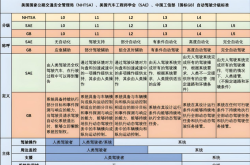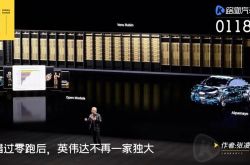Pay Later, Just to Scam Users?
![]() 11/21 2024
11/21 2024
![]() 514
514
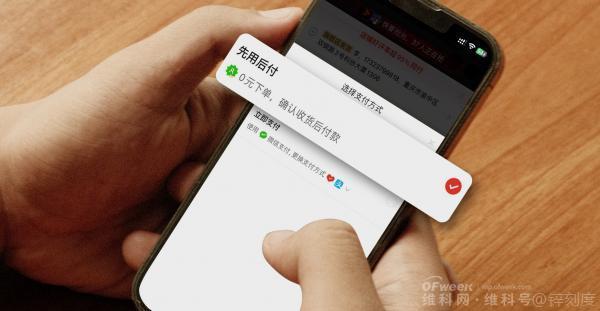
The Most Deceitful Feature Ever?
Written by Li Jinlin
Edited by Chen Dengxin
Typeset by Annalee
Young people are being blinded by 'buy now, pay later' deals, while seniors find themselves with 54 packages waiting to be picked up, and 'pay later' is devastating every user.
After the rush of Double 11, when it's time to confirm receipt of orders, some people find unfamiliar orders in their pending receipt list, others find they've been overcharged on carefully calculated orders, and still others see unexpected deduction notifications on their phones... Are these 'ghost stories' from our phones all orchestrated by 'pay later'?
From face recognition payments, fingerprint payments, to password-free payments and 'pay later,' platforms are doing everything they can to make placing orders seamless. While impulsive spending in the past could still be somewhat controlled by one's own will, today's increasingly convenient ordering methods seem to bring more risks.
An even more important question is, do we really need 'pay later' that is so convenient that it's almost uncontrollable?
Innocent Users, Suffering Merchants
'Pay later is the most deceitful feature I've ever used.' When it comes to 'pay later,' Liu Cheng can't contain his anger.
During Double 11, Liu Cheng bought a lot of household items and soft furnishings for his new home, and recently, it was time for automatic confirmation of receipt. But when he saw the payment information in the pop-up window, he was puzzled.
When he checked the details, he found that the storage box he ordered for 58.6 yuan had become 72 yuan at checkout; the tissue paper that was 24 yuan at order time became 33 yuan at checkout. Almost every order had some price difference, and after years of online shopping, this was the first time Liu Cheng had encountered such a situation.
The discrepancy lies in 'pay later.' 'When paying, I was trying to grab one of the top 100 spots for free orders from certain brands, so I placed the order quickly. I don't know why, but 'pay later' was prioritized for payment, and I accidentally clicked it. At the time, I wanted to keep my free order spot, so I planned to cancel 'pay later' after confirming receipt, but I didn't expect there to be a price difference in the end.'" Liu Cheng said.
Liu Cheng later contacted platform customer service and was told, 'Promotional activities vary by period on the platform, and the actual payment amount is final.'""In other words, even if the lowest price can be obtained at the time of ordering through the use of red envelopes, discounts, etc., once 'pay later' is used, everything may be "reset," and the final payment will be deducted based on the real-time price at the time of payment.""Most users, if they don't open the order details and don't remember the original order price, often don't even realize they've been taken advantage of.
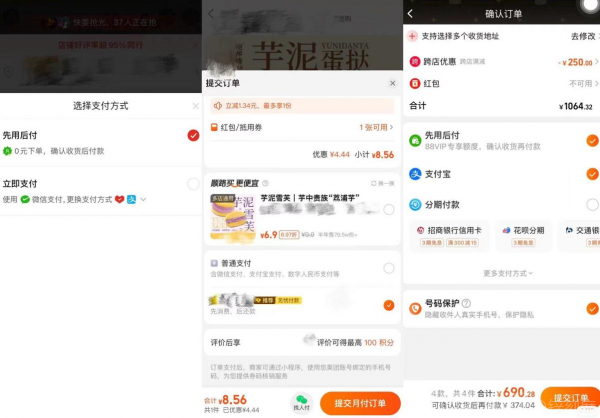
'Pay later' is often set as the default payment priority
And price differences are just the first pitfall of 'pay later.'
When Zheng Xiaoyu helped her parents download mobile apps, she found that there were many inexplicable orders in their shopping apps. After inquiring, Zheng Xiaoyu realized that these orders were generated due to 'pay later.'
'Seniors can easily be confused by the rules when shopping online. E-commerce platforms make the 'pay later' logo particularly eye-catching, while other payment methods require careful searching to find. Seniors who don't understand the rules often operate based on the platform's hints, ending up with a lot of orders,' Zheng Xiaoyu said.""However, this was not the first time Zheng Xiaoyu had helped her parents cancel the 'pay later' feature, and she even began to suspect that it was a trap specifically set for careless or elderly online shoppers. 'Pay later is easy to click on and is set as the default priority once activated, with a significant credit limit.' Zheng Xiaoyu believes that rather than being convenient for users, 'pay later' leaves more room for platform manipulation.""In addition to price differences and accidental clicks, 'pay later' also encourages impulsive spending. On platforms like Pinduoduo, Tmall, JD.com, and Meituan, the 'buy now, pay later' interface prominently displays the slogan 'order now, pay later,' stimulating users to make purchasing decisions quickly.""Furthermore, 'pay later' is often tied to WeChat credit scores and Sesame Credit, eliminating the need to enter a password during checkout, simplifying the payment process, and leading to an increase in impulsive orders.
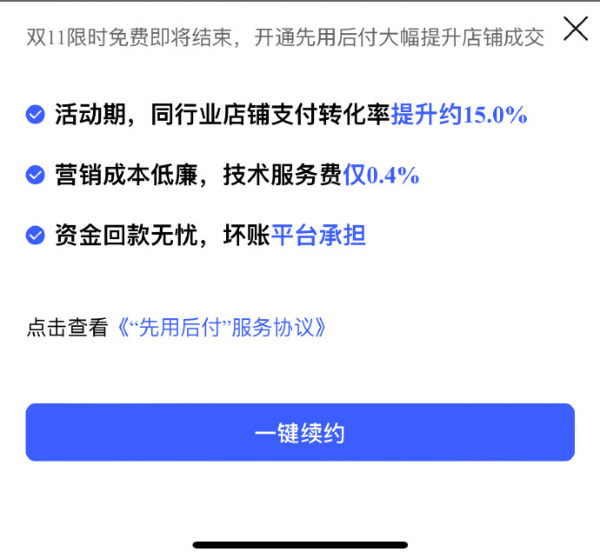
Merchant sharing the platform's 'pay later' service agreement
Among these orders, some people are willing to pay for their impulses, leading to transactions, while others regret their decisions and want their money back.""At this point, merchants are truly innocent. Even if the goods are eventually returned, the loss of shipping costs and platform technical service fees must be borne by the merchant. Previously, merchants told the media that since activating the 'pay later' feature, the return rate of their stores has increased significantly. While it may seem like order volume has increased, it actually brings more burden.""So, users are innocent, merchants are innocent, then who benefits from 'pay later'?""Who Are the Real Beneficiaries?
Many say that 'pay later' is an insane invention in the evolution of e-commerce, yet none of the e-commerce giants have missed out on this business.""According to an incomplete count by 21st Century Business Herald, multiple e-commerce platforms, including Pinduoduo, JD.com, Alibaba, Taobao, Youzan, Kuaishou, and Meituan, offer 'buy now, pay later' services to users. The main differences lie in the payment limit, interest-free period, and service fee charged to merchants.""If neither users nor merchants are the best beneficiaries of 'pay later,' then the platforms certainly are.""More user orders mean better sales data for the platform, and more merchant orders mean higher platform service fees.""Revenue is one aspect, but 'locking in' users is another.""According to the '14th Five-Year Plan for Electronic Commerce Development,' it is predicted that e-commerce transactions will reach 46 trillion yuan by 2025. The actual data for 2023 has already shown substantial progress towards this goal, with the market size reaching 50.57 trillion yuan.""It is evident that the overall upward trend of the e-commerce market remains significant. However, as platforms strive to seize opportunities, competition has become increasingly fierce.""Today, live streaming e-commerce, content e-commerce, and social e-commerce are vying for users, with various sales events explicitly aimed at emptying users' wallets. From 'pay later' to password-free payments, to only refunds and doorstep pickups, each service aims to shorten the time it takes for users to place orders, awaken more dormant users, and reduce the time and financial costs associated with returns and exchanges.""It seems thoughtful, but in practice, it's easy to be frustrating.
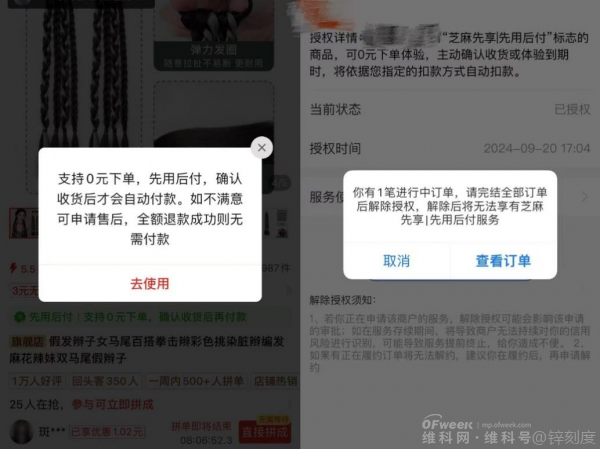
Easy to activate, hard to deactivate 'pay later'
There are countless users like Liu Cheng and Zheng Xiaoyu who have fallen into the traps of 'pay later.' Even young people have to put in some effort to find the entrance to deactivate the feature.""'Activating 'pay later' only takes one accidental click, but deactivating it requires seven steps.' On social platforms like Xiaohongshu, Douban, and Zhihu, there are many tutorials on how to cancel 'pay later,' and even young people need guidance from these tutorials to complete the process.""Taking Taobao's 'pay later' as an example, it needs to be operated on the Alipay app by clicking 'Me' -> 'Sesame Credit' -> 'My' -> 'Service Management' -> 'Taobao' -> 'Cancel Authorization.' Pinduoduo has two deactivation methods: the first is 'Open Settings' -> 'Pay Later Settings' -> 'Click the Exclamation Mark' -> 'Deactivate Pay Later,' and the second is to apply to customer service for permanent deactivation, a method often used by children to completely avoid pitfalls for their parents.""If platforms define 'pay later' as a feature to facilitate users and enhance their experience, why do users have completely opposite experiences?""In the name of convenience, platforms are reaching further and further, creating a 'ghost story' for users.""The scene is depicted in a popular Weibo post under the trending hashtag 'Why was Pay Later activated without my knowledge?': 'The platform said in the store, "Don't worry about paying now, just take it. I was confused and uneasy but took it anyway. After eating and using it, one night, as I lay in my bed, I suddenly felt hands reaching into my pocket to take money. I was startled, but the platform said, "Don't worry, I'm just here to collect the money for your last purchase."'""If this is not what users want, 'Ah Zu,' it's time to stop!

